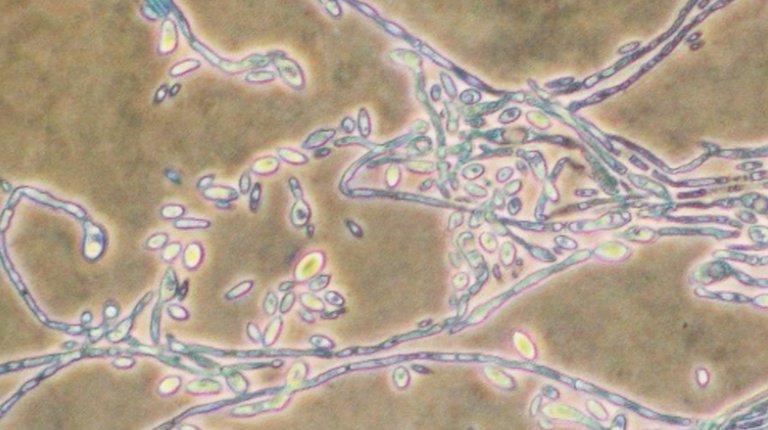The manipulation of fungi through ecology
To combat diseases caused by fungi, there are alternative treatments of fungicides for horticultural plants. The company Biofungitek manipulates the relationship between the plant and the fungus for this purpose, that is, it uses the same ecology.

A new plant in the garden. The miracle of life and, at the same time, the hope of the food source of human beings. However, in order for the plant to survive, it will have to fight the fungi. I'm pretty sure.
ANA RODRIGUEZ; biofungitek: The main problems in agriculture are not only caused by fungi. They are also caused by nematodes (some types of worms), insects, and they are also viruses that affect plants. We at Biofungitek only study fungal diseases. They're very common. They are the most common diseases in agriculture.
For years, fungicides have been the main defense against these living microscopes. But not that money will be forever.
ANA RODRIGUEZ; biofungitek: In my opinion, the unlimited use of chemical fungicides is over. Today everything is regulated and the health of the consumer and the environment are taken into account. There are strategies through very powerful chemical fungicides. They are very effective in treating the fungus and also very toxic, although they are effective against many diseases.
But there is also an alternative strategy: to take advantage of the ecology of the fungus, that is, to use the relationship between the fungus and the plant to control the growth of the fungus.
To do this, it is essential to know the biology and, above all, the chemistry of the fungus.
UNAI UGALDE; upv/ehu: Mushrooms, like animals, know how to store their territories or their places. And they tell each other where the other is through chemicals.
ANA RODRIGUEZ; biofungitek: We are experts in fungal biology and what we do is take advantage of this knowledge of fungi to make agricultural products. They are oriented to high value plantations: tomato, cucumber, zucchini, strawberry, pepper...
These fungi have been cultivated in the same Biofungitek. They will now collect and identify the substances produced by the fungi. But there's a problem.
UNAI UGALDE; upv/ehu: Mushrooms produce many substances. Bacteria also, but fungi much more, because their language is channeled through substances.
Therefore, these substances that are produced by fungi must be distributed and those that act as a signal must be chosen in order to develop products for treatment with them.
This liquid chromatograph performs the distribution work. Within the machine, the mixture of substances must follow a long path. Some will leave earlier than others. As they leave the machine, Biofungitek scientists will be able to collect and confirm the role of each substance in the biology of the fungus.
ANA RODRIGUEZ; biofungitek: The signals that fungi use to regulate themselves belong to many fields of biology. They are also signs that they must be sporulated to the fungus to adhere to the foliage, to detect that they are on a leaf and not elsewhere, to indicate that the area is occupied and that no one else has to grow there, and to prevent the spread of the fungus...
At Biofungitek we analyze them and look for a way to convert these self-regulation signals into useful products to control the growth of the fungus.
UNAI UGALDE; upv/ehu: Our strategy is not to kill the fungus directly, but to manipulate its relationship with the plant or, in some way, to become another agent in it. And to bring this relationship to the side of the plant.
The question is: what is the effectiveness of this ecological strategy? Are they in the range of known chemical fungicides?
ANA RODRIGUEZ; biofungitek: In general, Biofungitek products are as effective as many synthetic chemical fungicides.
Ecology and good results: this is why Biofungitek’s work has been awarded with the World Technology Award.
UNAI UGALDE; upv/ehu: This award, for us, is quite supportive, that is, we explained our project, what our products are and our research, and the proposal was seen by the people there in a way that was interesting and positive, and in the end we returned with the award.
The recognition of work is not an end. Mushrooms continue to grow, and scientists keep asking how.
UNAI UGALDE; upv/ehu: It is thought that we only know about 30%, that there are many more enzymes than the compounds that we actually know. Therefore, some years from now they will begin to produce new compounds, now through genetic manipulation, because they release the blockade that the fungus has, because we do not know where and when they use these enzymes to produce these special compounds. But I'm sure they'll do it sometime and when they need it.
ANA RODRIGUEZ; biofungitek: It is true that we still have a long way to go and that, in order to combat plant diseases, it can be used from a more ecological and sustainable perspective.
Buletina
Bidali zure helbide elektronikoa eta jaso asteroko buletina zure sarrera-ontzian











